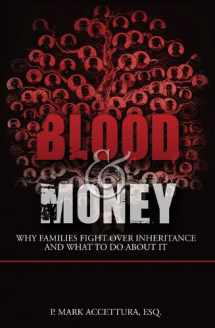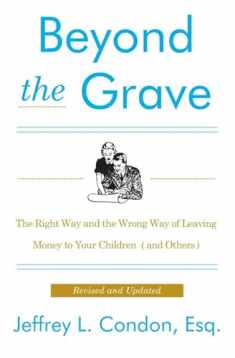
Blood & Money: Why Families Fight Over Inheritance and What To Do About It
Book details
Summary
Description
One way or another, inheritance touches almost everyone, and most of us either know or fear conflict after a death in the family. But what is it that so often drives people to wage war against their own flesh and blood over a loved one's estate?
This is the vexing question veteren estate planning and elder law attorney P. Mark Acettura sets out to answer in this thought-provoking and helpful book as he explains the psychology behind why people fight over estates and provides a comprehensive list of steps will makers, heirs, and their lawyers and advisors can take to prevent family-splitting inheritance disputes. Blood & Money: Why Families Fight Over Inheritance And What To Do About It looks beyond the usual too-simple characterization of quarreling heirs as simply greedy or petty to provide a first-ever full explanation of what makes survivors so often dissolve into combat even while they are still joined in grieving.
Accettura's conclusions are informed by his own three decades in the legal trenches, and aided by five years of research in the fields of social psychology, evoluntionary psychology, psychiatry, gerontology, and neuropsychology, with counsel from experts in those disciplines. The author suggests that what appear as greed and pettiness are really symptoms of survivors' struggle to feel loved and important, and to assuage the subconscious terror activated by a loved one's death. He concludes that the fight for money and things -- Dad's watch, Mom's wedding ring -- is not about the object or the money itself, but about what they symbolize: importance, love, security, self-esteem, connectedness, and immortality.
Families also often fight over bequests, he explains, because one or more members are seriously troubled. A significant number of inheritance disputes involve testators and beneficiaries who come from dysfunctional families, are mentally ill or addicted, or suffer from one or more Cluster B personality disorders: antisocial, borderline, histrionic, or narcissistic. Accettura explores the impact of these difficult personalities and contrasts such famously toxic super-rich personages as Leona Helmsley and Sumner Restone with the conspicuously philanthropic, such as Bill Gates and Warren Buffet. The story of Alfred Nobel is traced as an example of how it's possible to convert a potentially negative legacy into something altruistic.
Using the well-chronicled case of philanthropist Brooke Astor as a guide, the author tracks the overlapping phenomena of dysfunctional families, progressive dementia, elder abuse, and probate litigation. When perpetrated by those who stand to inherit, he says, elder abuse is, at its roots, an impatient inheritance dispute that cannot wait for the benefactor to die.
In a long, practical and concluding chapter, Accettura outlines appropriate legal protections and remedies to minimize the damage caused by bad actors. He details some sixty specific recommendations to help parents, offspring, and their advisors prevent inheritance misconduct and preserve the most valuable legacy of all: the family itself.


We would LOVE it if you could help us and other readers by reviewing the book
Book review




